Related Research Articles
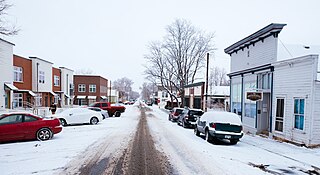
The City of Lafayette is a home rule municipality located in southeastern Boulder County, Colorado, United States. The city population was 30,411 at the 2020 United States Census.

The Ludlow Massacre was a mass killing perpetrated by anti-striker militia during the Colorado Coalfield War. Soldiers from the Colorado National Guard and private guards employed by Colorado Fuel and Iron Company (CF&I) attacked a tent colony of roughly 1,200 striking coal miners and their families in Ludlow, Colorado, on April 20, 1914. Approximately 21 people, including miners' wives and children, were killed. John D. Rockefeller Jr., a part-owner of CF&I who had recently appeared before a United States congressional hearing on the strikes, was widely blamed for having orchestrated the massacre.

The region that is today the U.S. State of Colorado has been inhabited by Native Americans and their Paleoamerican ancestors for at least 13,500 years and possibly more than 37,000 years. The eastern edge of the Rocky Mountains was a major migration route that was important to the spread of early peoples throughout the Americas. The Lindenmeier site in Larimer County contains artifacts dating from approximately 8720 BCE.
The Columbine Mine massacre occurred in 1927, in the town of Serene, Colorado. In the midst of the 1927-1928 Colorado Coal strike across the state, workers had been picketing one of the few remaining operating mines, in Serene. A fight broke out between Colorado state militia and a group of striking coal miners, during which the unarmed miners were attacked with firearms. The miners testified that machine guns were fired at them, which the state police disputed. Six strikers were killed, and dozens were injured.
Serene, Colorado is an extinct coal mining company town that was owned by the Rocky Mountain Fuel Company. Serene was located at the site of the Columbine Mine and had company housing and a coal preparation plant. The Serene post office operated from January 25, 1923, until August 31, 1942. Serene was the site of the Columbine Mine Massacre on November 21, 1927.
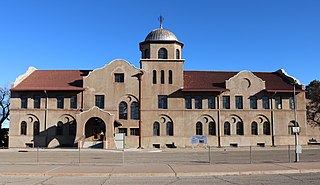
The Colorado Fuel and Iron Company (CF&I) was a large steel conglomerate founded by the merger of previous business interests in 1892. By 1903 it was mainly owned and controlled by John D. Rockefeller and Jay Gould's financial heirs. While it came to control many plants throughout the country, its main plant was a steel mill on the south side of Pueblo, Colorado and was the city's main industry for most of its history. From 1901 to 1912, Colorado Fuel and Iron was one of the Dow Jones Industrials. The steel-market crash of 1982 led to the decline of the company. After going through several bankruptcies, the company was acquired by Oregon Steel Mills in 1993, and changed its name to Rocky Mountain Steel Mills. In January 2007, Rocky Mountain Steel Mills, along with the rest of Oregon Steel's holdings, were acquired by EVRAZ Group, a Russian steel corporation, for $2.3 billion.

Frank J. Hayes was an American miner and president of the United Mine Workers of America (UMWA) from 1917 to 1919. A Democrat, he also served as Lieutenant Governor of Colorado in 1937–39.

Silent agitators are stickers used by the Industrial Workers of the World (IWW).
Labor spying in the United States had involved people recruited or employed for the purpose of gathering intelligence, committing sabotage, sowing dissent, or engaging in other similar activities, in the context of an employer/labor organization relationship. Spying by companies on union activities has been illegal in the United States since the National Labor Relations Act of 1935. However, non-union monitoring of employee activities while at work is perfectly legal and, according to the American Management Association, nearly 80% of major US companies actively monitor their employees.
Early coal mining in Colorado in the United States was spread across the state. Some early coal mining areas are currently inactive, including the Denver Basin and Raton Basin coal fields along the Front Range. There are currently 11 active coal mines, all in western Colorado.
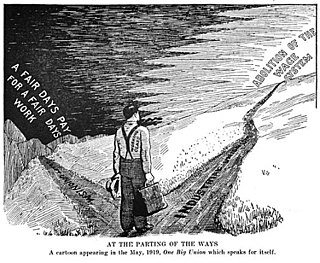
The Industrial Workers of the World (IWW) is a union of wage workers which was formed in Chicago in 1905 by militant unionists and their supporters due to anger over the conservatism, philosophy, and craft-based structure of the American Federation of Labor (AFL). Throughout the early part of the 20th century, the philosophy and tactics of the IWW were frequently in direct conflict with those of the AFL concerning the best ways to organize workers, and how to best improve the society in which they toiled. The AFL had one guiding principle—"pure and simple trade unionism", often summarized with the slogan "a fair day's pay for a fair day's work." The IWW embraced two guiding principles, fighting like the AFL for better wages, hours, and conditions, but also promoting an eventual, permanent solution to the problems of strikes, injunctions, bull pens, and union scabbing.

Karl E. Linderfelt was a soldier, mine worker, soldier of fortune, and officer in the Colorado National Guard. He was reported to have been responsible for an attack upon, and the ultimate death of, strike leader Louis Tikas during the Ludlow Massacre. He was the son of librarian Klas August Linderfelt.
The Rocky Mountain Fuel Company was a coal mining company located in Colorado, operating mines in Louisville, Lafayette, and other locations northwest of Denver. The company also operated mines in Las Animas, Routt, Garfield and Gunnison counties. During the 1930s, the company was the second-largest producer of coal by volume in the state of Colorado. However, the company was severely impacted by the Great Depression, declining productivity of local coal deposits, and the increased popularity of natural gas, and went bankrupt in 1944.

Anti-union violence is physical force intended to harm union officials, union organizers, union members, union sympathizers, or their families. It is most commonly used either during union organizing efforts, or during strikes. The aim most often is to prevent a union from forming, to destroy an existing union, or to reduce the effectiveness of a union or a particular strike action. If strikers prevent people or goods to enter or leave a workplace, violence may be used to allow people and goods to pass the picket line.
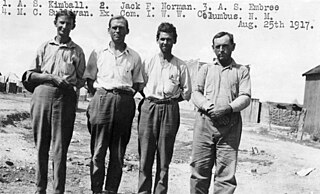
A. S. Embree was an American union organizer, Christian minister, and, leader in the Industrial Workers of the World (IWW). Embree served as the secretary-treasurer pro-tem of the national IWW for a period of two months after the national office was raided by federal agents.

The Colorado Coalfield War was a major labor uprising in the southern and central Colorado Front Range between September 1913 and December 1914. Striking began in late summer 1913, organized by the United Mine Workers of America (UMWA) against the Rockefeller-owned Colorado Fuel and Iron (CF&I) after years of deadly working conditions and low pay. The strike was marred by targeted and indiscriminate attacks from both strikers and individuals hired by CF&I to defend its property. Fighting was focused in the southern coal-mining counties of Las Animas and Huerfano, where the Colorado and Southern railroad passed through Trinidad and Walsenburg. It followed the 1912 Northern Colorado Coalfield Strikes.
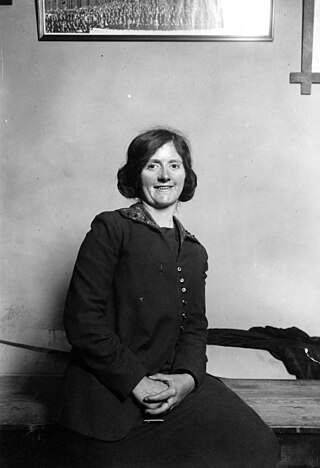
Mary Hannah Williams Thomas O'Neal was a Welsh-born American labor activist who wrote the only eyewitness memoir of the Ludlow Massacre, part of the Colorado Coalfield War.
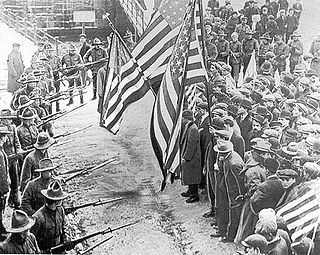
Anti-union violence in the United States is physical force intended to harm union officials, union organizers, union members, union sympathizers, or their families. It has most commonly been used either during union organizing efforts, or during strikes. The aim most often is to prevent a union from forming, to destroy an existing union, or to reduce the effectiveness of a union or a particular strike action. If strikers prevent people or goods to enter or leave a workplace, violence may be used to allow people and goods to pass the picket line.

Berwind is a ghost town in Las Animas County, Colorado, nestled in Berwind Canyon 3.1 miles (5.0 km) southwest of Ludlow and 15 miles (24 km) northwest of Trinidad. The settlement was founded in 1888 as a company town for the Colorado Coal & Iron Company and, from 1892, was operated by the Colorado Fuel & Iron Company. It was a battle site in October 1913 and April 1914 during the Colorado Coalfield War, housing a Colorado National Guard encampment during the latter stages of the conflict.

The 1927–1928 Colorado Coal Strike was a spreading strike, spearheaded by the Industrial Workers of the World. The exact number of workers involved is unclear due to the nature of the strike. However, it shutdown nearly all of Colorado's coal mines.
References
- ↑ Caspian: The Caring City, 1918-1993. Caspian Diamond Jubilee Book Committee. 1993.
- "Girl Injured by Mine Guard in Rioting". Waukesha Freeman. October 28, 1927.
- "'Flaming' Milka, Girl Strike Leader, Enters Duluth School". Duluth News-Tribune February 22, 1928.
- "1907 Immigration Record for Sablich Family". from Ellis Island ship manifests.